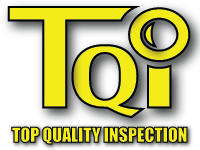Corrosion is an ever-present danger, in the oil and gas industry, responsible for costly breakdowns, accidents, and shortened life-cycles. The application of coatings is crucial for protecting assets from corrosion. Coatings act as a barrier against corrosive elements extending the life of pipelines, plants, refineries, and subsea equipment. The role of AMPP (formerly NACE) certified coating inspectors is paramount in ensuring the proper application of coatings and maintaining the integrity of critical infrastructure.

What is AMPP?
NACE, or the National Association of Corrosion Engineers, combined forces with SSPC, or Society for Protective Coatings, to form a global organization known as AMPP, or The Association for Materials Protection and Performance. AMPP represents the gold standard for coatings and corrosion controls certifications and standards for professionals working in the cathodic protection industry.
The Role of Coatings Application in the Oil and Gas Industry
The correct application of coatings is essential for asset protection in the oil and gas industry. Coatings act as a protective shield, safeguarding infrastructure from corrosion, chemical exposure, and other environmental factors. Properly applied coatings significantly reduce the risk of asset damage, enhance safety, and minimize maintenance costs.
WHY YOU NEED CERTIFIED COATING INSPECTORS
NACE / AMPP certified coating inspectors ensure that coating applications are performed successfully per specifications, relevant industry standards, and coating manufacturer’s recommendations. Here’s why it matters:
a. Ensuring Adherence to Specifications, Standards, and Manufacturer Recommendations
Certified coating inspectors are trained and certified to read, interpret, and enforce end user specifications, industry standards, and manufacturer recommendations. These three components work in tandem to establish a very specific procedure for proper application technique designed to reduce the likelihood of coating failures, protect all personnel involved with said coating application from potential safety hazards, and extend the life cycle of the coating system being applied. Achieving those goals drastically reduces to costs associated with operation of affected facilities.
b. Monitoring Application Techniques
Certified coating inspectors are trained to assess coating application techniques. They can identify a multitude of issues such as improper surface preparation, improper storage or mixing of coating product, surface contaminants, inadequate or excessive coating thickness, inadequate curing, surface defects, and many more. Identifying the many things that can go wrong early in the application process allows applicators to take corrective measures promptly to ensure the integrity and efficiency of the coating system.
c. Regulatory Compliance
Regulatory compliance is critical in the oil and gas industry. One of the many roles of the certified coating inspector is to accurately document all coating activities which helps ensure that compliance. This is vital for avoiding potential legal and financial liabilities.

SPECIFIC APPLICATIONS OF AMPP / NACE CERTIFIED COATING INSPECTORS
Certified coating inspectors are invaluable in several areas within the oil and gas industry:
a. Pipelines
Coating inspectors play a critical role in overseeing the application of coatings to pipelines. They ensure that coatings are correctly applied to prevent corrosion and protect against external environmental factors during transportation.
b. Plants and Refineries
Industrial plants and refineries require various coatings on equipment and structures to withstand harsh conditions and prevent corrosion. Certified coating inspectors monitor the application process to ensure proper coverage and protection.
c. Subsea Equipment
Subsea equipment is highly susceptible to corrosion due to constant exposure to seawater. Coating inspectors verify the application of coatings on subsea assets, safeguarding them from the corrosive effects of the marine environment.

Conclusion
AMPP (formerly NACE) certified coating inspectors play a vital role in safeguarding oil and gas infrastructure through the proper application of coatings. Their expertise ensures adherence to industry standards, enhances asset protection, and contributes to the overall safety and efficiency of operations within the oil and gas industry.

